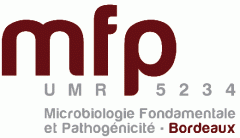
For the contract 2022-2027, the Antimicrobial Resistance in MYcoplasmal and gram-NEgative bacteria “ARMYNE” team has been created by merging the research unit “Infections Humaines à Mycoplasmes et à Chlamydiae” (IHMC) with part of MFP Team 1 focusing on antimicrobial resistance (AMR) of Gram-negative bacteria.. Our close links with the Bacteriology department and with the National Reference Center (CNR) for bacterial Sexually Transmitted Infections (STIs) at CHU Bordeaux, the different national and inter-regional “Protocole de Recherche Clinique Hospitalière” coordinated by some biologists of the team are an important workforce giving specific access to collections of clinical resistant bacteria of interest and their related specimens.
AMR is a major public health problem, mainly in Gram-negative rods such as third-generation cephalosporins (3GC)-resistant enterobacteria that produce extended-spectrum ß-lactamases (ESBL) and P. aeruginosa (https://www.who.int/news/item/27-02-2017-who-publishes-list-of-bacteria-for-which-new-antibiotics-are-urgently-needed), but also as well as in STIs caused by urogenital mycoplasmas (Center for Diseases Control, Antibiotic resistance threats in the United States, 2019). This was the opportunity to create a unique team on Medical Bacteriology, working on fundamental and applied aspects of AMR in Gram-negative bacteria and urogenital mycoplasmas involved in STIs in Bordeaux. We will focus on two different complementary bacterial models (one with complex envelops and one with a sole trilayered cell membrane) having acquired AMR, (i) Gram-negative bacteria (enterobacteria and Pseudomonas spp.) with their impermeable outer membrane and the efficient elimination of antibiotics by efflux pumps, and on (ii) urogenital mycoplasmas that lack a cell wall with an intrinsic resistance against several families of antibiotics including ß-lactamins.
We aim to decipher the resistance mechanisms in these bacteria, which are mediated either by chromosomal mutations or by Mobile Genetic Elements (MGE). Beside the consequences of chromosomal mutations on antibiotic susceptibility, two kinds of MGE, Insertion Sequences (IS) and Integrative and Conjugative Elements (ICEs), will be studied in Gram-negative bacteria and mycoplasmas: (i) IS, which are small MGE widespread in genomes of human and animal bacteria. (ii) ICEs, which are MGE present in both Gram-negative bacteria including P. aeruginosa and in mycoplasmas. Working on two different models gives us the opportunity to use common techniques as horizontal gene transfer study by mating or NGS, and to explore and compare the ICE functionality and their regulation mechanisms. Several genetic, genomic, machine learning, and proteomic analyses will be shared and used.
